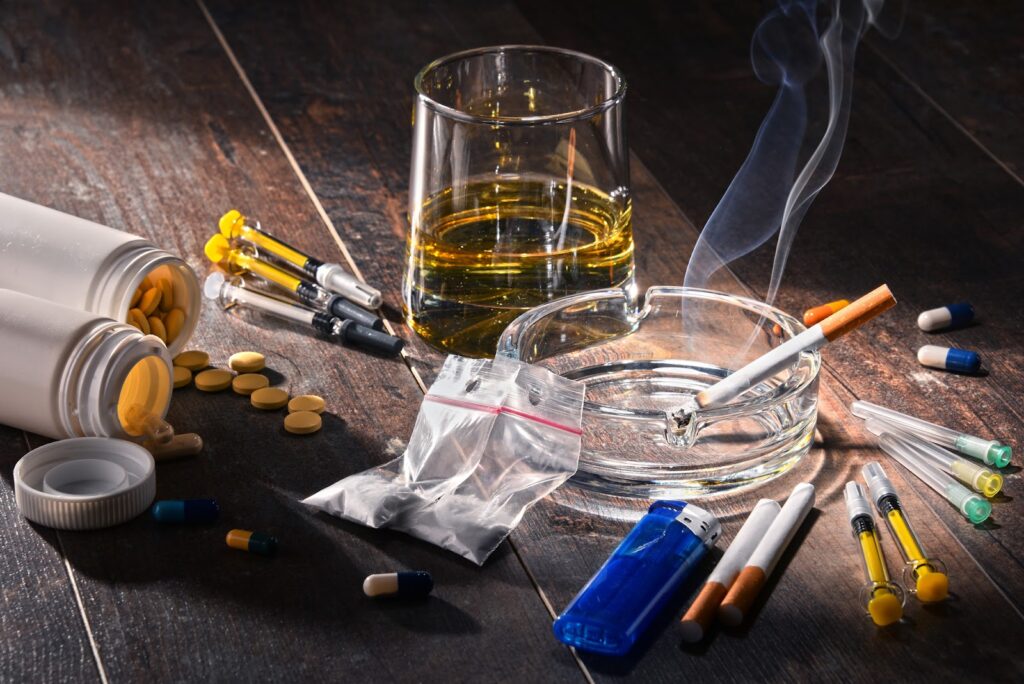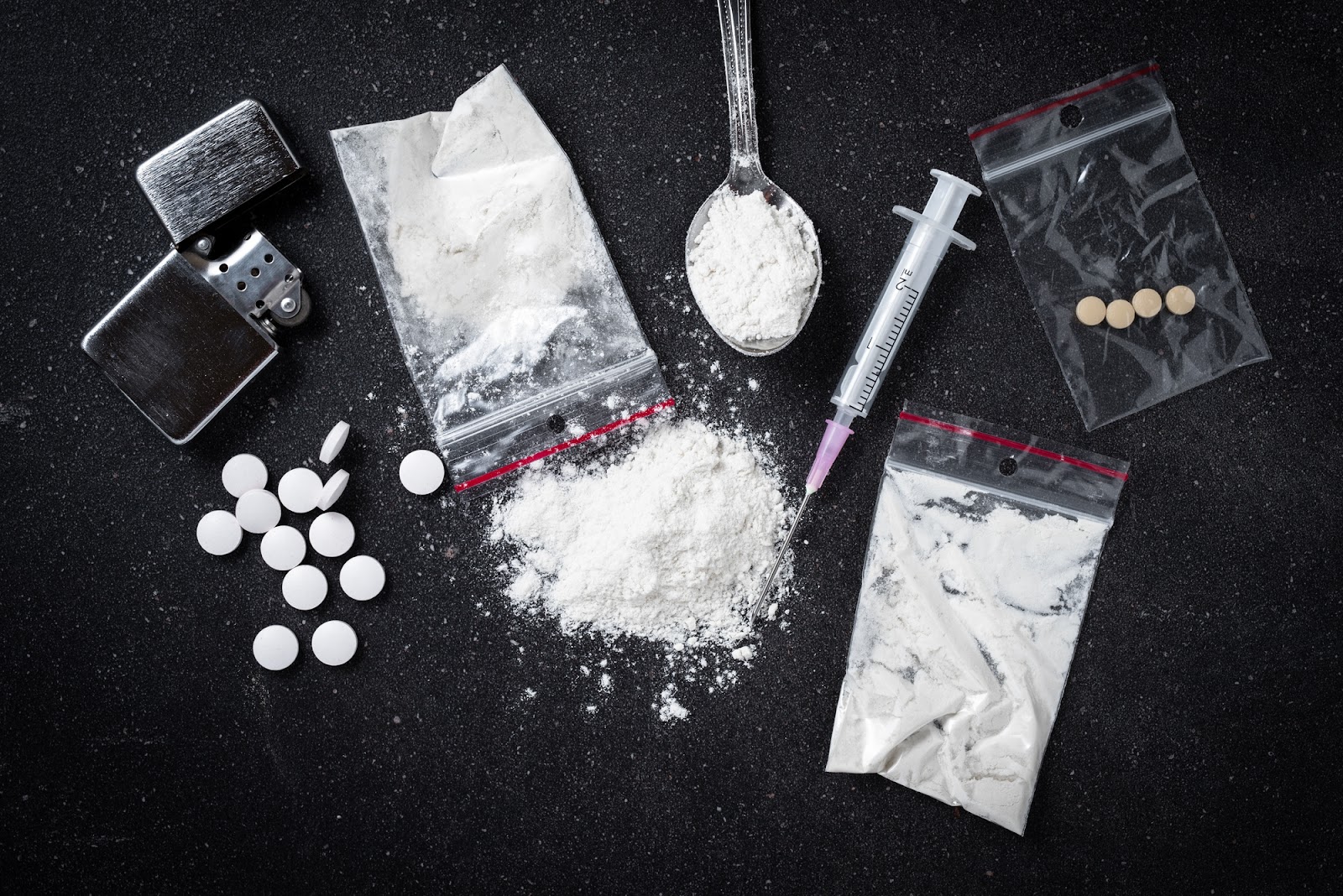
Addictive substances, including alcohol, cigarettes and drugs.
Everyone has heard of addiction and substance abuse, but not everyone knows what it means or how to identify the different types. Whether you’re dealing with a situation personally or simply looking for more information to better understand what people are going through when recovering from addiction and substance abuse, this blog post is for you.
Learn about the different addiction and substance abuse types, including their signs and symptoms and potential treatments that can help transform lives. Keep reading to gain a greater insight into these issues.
Causes Of Addiction And Substance Abuse
There are many different causes of addiction and substance abuse, but the most common culprits include mental health issues, stress, childhood trauma, and environmental factors. Mental health issues such as depression and anxiety can cause individuals to turn to drugs and alcohol to cope with difficult emotions or feelings.
Stressful life events, such as a family and relationship breakup or the death of a loved one, can also lead individuals to turn to drugs and alcohol as an escape. Early childhood trauma can lead individuals to self-medicate to manage their intense emotions. Finally, environmental factors such as peer pressure or being raised around substance abuse can influence an individual’s likelihood of developing an addiction.
Addiction and substance abuse are complex issues, and the causes can vary greatly from person to person. There’s no single cause of addiction, but understanding the potential causes can help individuals seek the proper treatment and support they need.
The Quest 2 Recovery program is designed to help individuals overcome physical and mental health challenges caused by injury or illness. As a comprehensive recovery program, Quest 2 Recovery offers a multi-faceted approach that includes physical therapy, cognitive therapy, psychotherapy, and nutritional guidance.
With a team of medical professionals and support staff, Quest 2 Recovery strives to provide quality care to those seeking a comprehensive approach to recovery.
Classification of Addictions
Addiction is a severe problem affecting millions of people across the world. It’s necessary to recognize and understand the different types of addiction to effectively identify, treat, and support those affected by it. Addiction is classified into two major categories; substance/chemical addiction and behavioral addiction
Chemical (Substance) Addiction
Substance abuse is the use of drugs or alcohol in a manner that puts the user at risk for harm. It’s characterized by frequent intoxication, impaired control over drug/alcohol use, persistent problems with law enforcement, interpersonal conflict, and risky behavior. It can also cause significant disruptions in daily life, affecting relationships, employment, and overall health.
Substance addiction is characterized by compulsive and excessive use of drugs or alcohol, usually accompanied by physical dependence. Common substances include alcohol, marijuana, cocaine, or opiates like heroin.
- Prescription Drug Addiction
Prescription drug addiction is a growing problem across the United States. This type of substance abuse refers to the misuse and overuse of prescription drugs for non-medical purposes.
Prescription drug addiction, also known as prescription drug use disorder (PDUD), is a chronic condition characterized by a physical and psychological dependence on prescription drugs. These prescription drugs include but aren’t limited to, opioids, central nervous system depressants, and stimulants.
People with prescription drug addiction may have difficulty controlling their use of these drugs. They may continue to use these despite negative consequences such as health problems, relationship issues, and financial difficulties.
These individuals may be trying to get high, relieve stress or sleep issues, or even self-medicate mental health issues without seeing a professional. Unfortunately, this often leads to physical addiction and severe consequences down the road if not addressed promptly.
Long-term effects can include severe damage to vital organs. Fortunately, treatment options are available for anyone suffering from this chemical addiction. Centers like Jackson House Rehab understand that every individual is uniquely wired and treat each client’s situation with sensitivity and experience. Their expertise in different kinds of chemical addictions helps those struggling with a personalized program tailored to their specific needs.
- Opioid Addiction
Opioid addiction has been an increasingly common issue throughout society for many years. Opioid addiction is a type of substance addiction that involves the compulsive use of opioids, which are a class of drugs that includes prescription pain medications and illicit drugs.
Opioid addiction can develop quickly, mainly when opioids are used for a long time or at high doses. Over time, the brain adjusts to the presence of opioids and begins to rely on them for normal functioning, leading to compulsive drug seeking and use despite the negative consequences.
- Nicotine Addiction

Substance abuse and addiction are significant downfalls that can affect anyone, regardless of age or background. Although most often associated with alcohol, drugs, and other substances, nicotine use is one of the most widely known addictions affecting people across the world.
To those in its grip, nicotine addiction can have a powerful hold on their lives, leaving them feeling helpless and alone in their struggles. It’s not just cigarettes that can cause addiction; e-cigarettes can be just as addictive due to the chemical composition found in many brands of flavored liquids used to refill them.
- Cannabis Addiction
Substance abuse and addiction, particularly to cannabis, have become an increasing concern for public health authorities in recent years. Psychological dependence on marijuana characterizes cannabis addictions.
People suffering from cannabis addiction can experience withdrawal symptoms such as cravings, mood swings, and depression when they cannot access the drug, leading to changes in behavior. This can include social isolation and criminal activities if not adequately managed.
- Methamphetamine Addiction
Methamphetamine addiction is a type of substance addiction that involves the compulsive use of methamphetamine, a highly addictive stimulant drug. Methamphetamine is commonly known as ‘meth,’ ‘crystal,’ or ‘ice.’
Methamphetamine addiction can develop quickly, particularly when the drug is used in high doses or over a long period. The brain adjusts to the presence of methamphetamine and begins to rely on it for normal functioning, leading to compulsive use despite the negative consequences.
- Cocaine Addiction
Cocaine addiction is a type of substance addiction involving the impulsive use of cocaine, a highly addictive stimulant drug. Cocaine is commonly known as ‘coke,’ ‘crack,’ or ‘snow.’
Cocaine addiction can develop quickly, particularly when the drug is used in high doses or over a long time. Over time, the brain adjusts to cocaine and begins to rely on it for normal functioning, leading to compulsive use despite the negative consequences.
- Alcohol Addiction
Alcohol addiction is one of the most commonly discussed topics when it comes to substance and alcohol abuse. A person addicted to alcohol has a strong physical and psychological dependence on ethanol which is found in many alcoholic drinks.
Over time, someone with an addiction will use more significant amounts at higher frequencies to achieve the desired effect. Unfortunately, as this pattern or behavior continues, it can cause tremendous damage to the individual and their friends and families.
Significant side effects include physical and mental health problems, financial strain, and difficulty managing relationships. Despite these challenges, many paths are available for treatment for those dealing with alcohol addiction. Therefore, understanding the risks associated with drinking and acknowledging that help is available whenever needed is essential.
- Inhalant Addiction

Inhalant abuse and addiction are growing societal problems, especially among young adults. The substances typically abused include glue, hair spray, lighter fluid, or insecticides. These materials are inhaled through the nose or mouth. They produce mind-altering sensations that encourage continued use and potential addiction.
Even more dangerous is that many of these products may be found around homes, making them accessible to everyone searching for a cheap high. Once addicted, the user can face serious health risks, including brain damage, heart attack, coma, or even death if the abusive behavior persists unchecked.
- Signs And Symptoms Of Substance/Chemical Addiction
Substance use disorder, also known as substance abuse or addiction, is a chronic and degenerating brain disease. The signs and symptoms of substance addiction can vary depending on the type of substance being used, but some common signs and symptoms include the following:
- Intense cravings for the substance
- Difficulty controlling or reducing substance use
- Spending a lot of time using the substance or recovering from its effects
- Neglecting responsibilities and activities in favor of substance use
- Using the substance despite the problems it causes
- Risky behavior while under the influence of the substance
- Building up a tolerance to the substance, thus needing more to achieve the desired effects
- Withdrawal symptoms when not using the substance, such as agitation, irritability, fatigue, and tremors
Other signs and symptoms of substance use disorder can include:
- Physical problems, such as chronic fatigue, headache, and changes in appetite or sleep patterns
- Mental health problems, such as anxiety, depression, and paranoia
- Social issues, such as strained relationships, loss of employment, and financial difficulties
- Legal problems, such as arrests for DUI or drug-related crimes
- Changes in personal appearance or hygiene
Substance use disorder is a treatable disease, so early intervention can help prevent further harm and improve the chances of successful recovery.
Treatment Options For Substance Abuse And Addiction
Fortunately, treatment options are available to help individuals regain control of their lives. These include:
- Professional therapy/counseling
- Medication-assisted treatment (MAT)
- Support groups
- Lifestyle changes such as nutrition adjustments, exercise, and relaxation techniques
- Inpatient programs or residential treatment centers
- Detoxification programs
- Long-term recovery plans
Substance use disorders are complex conditions that require professional diagnosis and evidence-based treatments for effective management. With appropriate care and support, individuals suffering from these can lead healthier lives. Getting help as soon as possible increases the chance of long-term success.
When seeking treatment, you may want to look for evidence-based approaches that have been proven effective in treating substance use disorders. These approaches often include cognitive-behavioral therapy (CBT), motivational enhancement therapy (MET), and contingency management interventions. Additionally, medications such as naltrexone, buprenorphine, and methadone may be prescribed, but it depends on the disorder’s severity.
With proper diagnosis, treatment, and support, individuals suffering from substance use disorders can live healthier lives and be more successful in their recovery.
Behavioral Addiction
Behavioral addiction is a type of addiction that focuses on compulsive behavior and activities rather than substance use associated with traditional addictions.
Behavioral addiction is an obsession with an activity or habit to the point where it interferes with day-to-day life. This can include anything from gambling to excessive video game playing. Here are some behavioral addictions:
- Gambling
Behavioral addictions, such as gambling addiction, are characterized by problematic behavior employed to satisfy a craving for something. Gambling can signify anything from slot machines to sports betting.
Left unchecked and uncontrolled, gambling can wreak havoc on one’s personal life through financial problems and interpersonal conflict with family members or friends. Those who experience this type of addiction may need professional help. Intervention can help them to overcome the cycle of continuing to engage in destructive behavior even when they know it may produce ruinous outcomes.
Behavioral addictions aren’t necessarily limited to indulging in activities such as gambling, drinking, and using drugs. Eating disorders such as anorexia nervosa and bulimia can also be classed as behavioral addictions.
Characterized by an unhealthy obsession with food and body weight, this type of addictive behavior can have severe physical effects due to the lack of nutrition often associated with extreme weight-loss diets. Individuals who suffer from this addiction tend to display irrational approaches toward food and dieting. Plus, they may require professional intervention to overcome their addiction.
- Internet Gaming Disorder
Behavioral addictions are becoming more prevalent in the modern world, going far beyond harmful substances like alcohol or drugs. One type of such addiction that has begun to gain attention is known as internet gaming disorder. It occurs when a person becomes overly dependent on and spends excessive time playing video games. The effects of this can be different from person to person. But they often include physical and mental impairments, social isolation, and difficulty focusing on other tasks.
Remember that just because it’s not a traditional addiction doesn’t mean it can’t be dangerous. If you or someone you know may be struggling with an unhealthy relationship with gaming, don’t ignore the issue. Seek help from mental health professionals to ensure your well-being.
- Signs & Symptoms of Behavioral Addiction
The signs and symptoms of behavioral addiction are similar to those of substance use disorders. These can include:
- Preoccupation with the behavior in question
- Withdrawal symptoms when not engaging in the behavior
- Neglecting responsibilities or social activities because of the behavior
- Increasing tolerance for the activity (needing more frequent or intense engagement)
- Negative consequences from engaging in the activity (financial issues, relationship problems, etc.)
Because behavioral addiction doesn’t involve the consumption of any substances, many people don’t recognize behavior-based addictions as real addictions. However, this type of addiction is just as damaging—if not more so—as traditional addictions.
For this reason, it’s essential to recognize the signs and symptoms early on to get the proper treatment. With the right help and support, it’s possible to overcome this addiction and live healthier lives.
- Treating Behavioral Addiction
Treatment for behavioral addiction often focuses on reducing how often you engage in addictive behavior and learning healthier coping mechanisms.
Cognitive behavioral therapy (CBT) and motivational interviewing are two common treatments for this addiction. Treatment programs may also include 12-step meetings, self-help groups, support from family and friends, medication, and lifestyle changes.
Recap
Addiction and substance abuse are complex and multifaceted issues that can seriously impact individuals, their families, and their communities. Understanding the different types of addiction is essential to recognizing the problem and seeking appropriate help.
Behavioral addictions, such as gambling and gaming addictions, can be just as damaging as substance addictions and lead to similar physical, mental, and social problems.
Common signs and symptoms of substance addiction and abuse include intense cravings, difficulty controlling or reducing substance use, neglecting responsibilities and activities, using the substance despite adverse consequences, and withdrawal symptoms.
Treatment for addiction and substance abuse can include a combination of behavioral therapies. Recovery is a long-term process that requires ongoing support and care, and individuals may benefit from seeking help from support groups and community resources.












